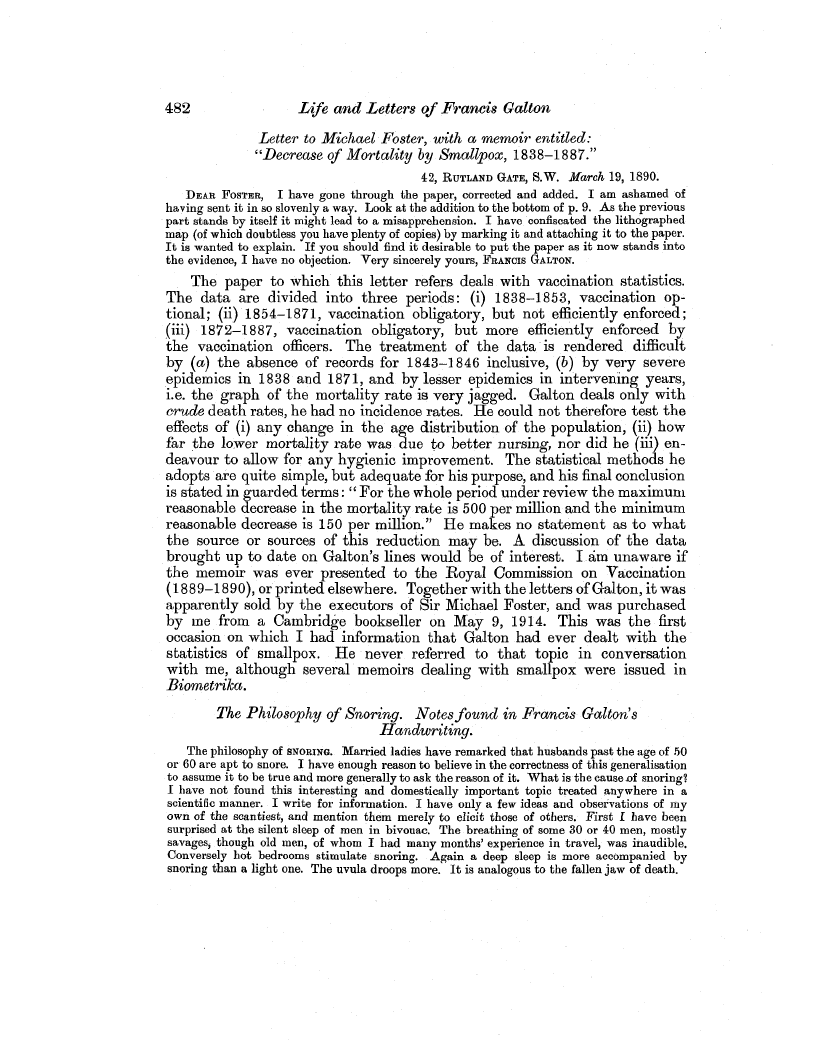| ||||||

OCR Rendition - approximate
482 Life and Letters of Francis Galton Letter to Michael Foster, with a memoir entitled: "Decrease, of Mortality by Smallpox, 1838-1887." 42, RUTLAND GATE, S.W. March 19, 1890. DEAR FOSTER, I have gone through the paper, corrected and added. I am ashamed of having sent it in so slovenly a way. Look at the addition to the bottom of p. 9. As the previous part stands by itself it might lead to a misapprehension. I have confiscated the lithographed map (of which doubtless you have plenty of copies) by marking it and attaching it to the paper. It is wanted to explain. If you should find it desirable to put the paper as it now stands into the evidence, I have no objection. Very sincerely yours, FRANCIS GALTON. The paper to which this letter refers deals with vaccination statistics. The data are divided into three periods: (i) 1838-1853, vaccination optional; (ii) 1854-1871, vaccination obligatory, but not efficiently enforced; (iii) 1872-1887, vaccination obligatory, but more efficiently enforced by the vaccination officers. The treatment of the data is rendered difficult by (a) the absence of records for 1843-1846 inclusive, (b) by very severe epidemics in 1838 and 1871, and by lesser epidemics in intervening years, i.e. the graph of the mortality rate is very jagged. Galton deals only with crude death rates, he had no incidence rates. He could not therefore test the effects of (i) any change in the age distribution of the population, (ii) how far the lower mortality rate was due to better nursing, nor did he (iii) endeavour to allow for any hygienic improvement. The statistical methods he adopts are quite simple, but adequate for his purpose, and his final conclusion is stated in guarded terms : " For the whole period under review the maximum reasonable decrease in the mortality rate is 500 per million and the minimum reasonable decrease is 150 per million." He makes no statement as to what the source or sources of this reduction may be. A discussion of the data brought up to date on Galton's lines would be of interest. I. am unaware if the memoir was ever presented to the Royal Commission on Vaccination (1889-1890), or printed elsewhere. Together with the letters of Galton, it was apparently sold by the executors of Sir Michael Foster, and was purchased by me from a Cambridge bookseller on May 9, 1914. This was the first occasion on which I had information that Galton had ever dealt with the statistics of smallpox. He never referred to that topic in conversation with me, although several memoirs dealing with smallpox were issued in Biometrika. The Philosophy of Snoring. Notes found in Francis Galton's
The philosophy of SNORING. Married ladies have remarked that husbands past the age of 50 or 60 are apt to snore. I have enough reason to believe in the correctness of this generalisation to assume it to be true and more generally to ask the reason of it. What is the cause of snoring? I have not found this interesting and domestically important topic treated anywhere in a scientific manner. I write for information. I have only a few ideas and observations of my own of the scantiest, and mention them merely to elicit those of others. First I have been surprised at the silent sleep of men in bivouac. The breathing of some 30 or 40 men, mostly savages, though old men, of whom I had many months' experience in travel, was inaudible. Conversely hot bedrooms stimulate snoring. Again a deep sleep is more accompanied by snoring than a light one. The uvula droops more. It is analogous to the fallen jaw of death.
|